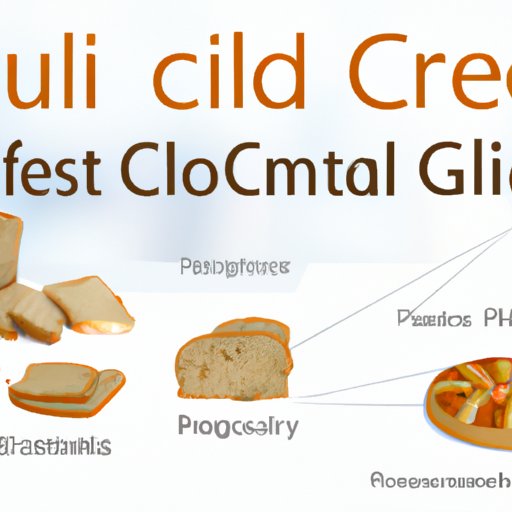Introduction
Celiac disease is an autoimmune disorder that affects the digestive system. People with celiac disease cannot tolerate gluten, a protein found in wheat, barley, and rye. When someone with celiac disease consumes gluten, their body mounts an immune response that damages the small intestine and interferes with the absorption of nutrients from food. To manage the symptoms of celiac disease and prevent further damage to the digestive system, people with celiac disease must follow a strict gluten-free diet.

Overview of Celiac Disease Diet
The celiac disease diet is a type of gluten-free diet that eliminates all foods containing gluten. This includes wheat, barley, rye, and some oats. It also eliminates any foods that may have been cross-contaminated with gluten during manufacturing or processing. The goal of the celiac disease diet is to eliminate as much gluten as possible from the diet to reduce symptoms and prevent further damage to the digestive system.

Exploring the Benefits of a Celiac Disease Diet
Following a celiac disease diet can provide numerous health benefits. These include improved digestive health, reduced risk of complications from celiac disease, and better overall nutritional health.
Improved Digestive Health
Eliminating gluten from the diet can help improve digestive health for those with celiac disease. By avoiding gluten, people with celiac disease can reduce inflammation in the small intestine and help restore the natural balance of bacteria in the gut. This can help reduce common symptoms of celiac disease such as abdominal pain, bloating, and diarrhea.
Reduced Risk of Complications from Celiac Disease
People with celiac disease who adhere to a gluten-free diet are also less likely to experience long-term complications from the condition. Following a gluten-free diet can help reduce the risk of developing other autoimmune disorders, nutrient deficiencies, and other serious health problems associated with celiac disease.
How to Follow a Gluten-Free Diet for Celiac Disease
Adhering to a gluten-free diet requires careful planning and preparation. Here are some tips for following a gluten-free diet for celiac disease.
Shopping for Appropriate Foods
When shopping for groceries, it’s important to read labels carefully. Many processed foods contain hidden sources of gluten. Pay close attention to the ingredients list, and look for products that have a “gluten-free” label. Additionally, many stores now offer dedicated gluten-free sections and specialty products that make it easier to find safe foods.
Preparing Gluten-Free Meals
When preparing meals at home, focus on fresh, whole foods that are naturally gluten-free. These include fruits, vegetables, lean proteins, and gluten-free grains such as quinoa and rice. Avoid processed or pre-made meals, as these often contain hidden sources of gluten. When baking, use gluten-free flours instead of wheat flour.
Navigating Eating Out with Celiac Disease
Eating out can be challenging for people with celiac disease. Here are some tips for eating out safely.
Choosing Restaurants
When choosing a restaurant, look for places that offer gluten-free options. Many restaurants now offer gluten-free menus or clearly mark gluten-free items on their regular menus. If you’re unsure, ask the server or chef about the ingredients in each dish. It’s also important to avoid buffets, as cross-contamination is more likely.
Communicating Dietary Needs
When ordering, let your server know that you have celiac disease and need to follow a strict gluten-free diet. Ask questions about how the food is prepared and whether there is any risk of cross-contamination. If you’re still unsure, ask the server to check with the kitchen.
Tips and Tricks for Sticking to a Gluten-Free Diet
Sticking to a gluten-free diet can be difficult, but there are some tricks that can make it easier. Here are some tips for sticking to a gluten-free diet.
Identifying Hidden Sources of Gluten
Gluten can be found in many unexpected places. Be sure to read labels carefully and avoid processed or pre-made foods whenever possible. Additionally, watch out for hidden sources of gluten such as soy sauce, beer, and some candy.
Finding Alternatives to Gluten-Containing Foods
There are many delicious alternatives to traditional gluten-containing foods. Look for gluten-free substitutes for bread, pasta, and other baked goods. There are also many gluten-free flours available that can be used for baking.

Understanding the Nutritional Needs of People with Celiac Disease
People with celiac disease have unique nutritional needs. To ensure optimal health, it’s important to make sure that these needs are met. Here are some tips for getting the proper nutrients on a gluten-free diet.
Proper Vitamin and Mineral Intake
Following a gluten-free diet can lead to deficiencies in certain vitamins and minerals. Make sure to take a daily multivitamin and, if necessary, additional supplements to make up for any deficiencies. Additionally, eat a variety of nutrient-rich foods such as fruits, vegetables, lean proteins, and healthy fats.
Adequate Hydration
It’s important to drink plenty of fluids when following a gluten-free diet. Water is the best choice, but other beverages such as fruit juice and herbal tea can also be consumed. Avoid sugary drinks such as soda, as these can increase the risk of weight gain.
The Risks of Not Following a Celiac Disease Diet
Not following a gluten-free diet can have serious consequences for people with celiac disease. The most common risks include malnutrition and digestive issues.
Malnutrition
Consuming gluten can interfere with the body’s ability to absorb nutrients from food, leading to malnutrition. Malnutrition can cause fatigue, weight loss, and other serious health problems.
Digestive Issues
Consuming gluten can also trigger digestive issues such as abdominal pain, bloating, and diarrhea. Additionally, consuming gluten can lead to further damage to the small intestine and an increased risk of complications from celiac disease.
Conclusion
Following a celiac disease diet is essential for managing the symptoms of celiac disease and preventing further damage to the digestive system. The celiac disease diet eliminates all foods containing gluten, including wheat, barley, rye, and some oats. Adhering to a gluten-free diet provides numerous health benefits, including improved digestive health and reduced risk of complications from celiac disease. Additionally, it’s important to make sure that nutritional needs are met by taking a multivitamin, eating a variety of nutrient-rich foods, and drinking plenty of fluids. Not following a gluten-free diet can lead to malnutrition and digestive issues, so it’s important to stick to the diet to maintain good health. For more information, consult a doctor or nutritionist.
(Note: Is this article not meeting your expectations? Do you have knowledge or insights to share? Unlock new opportunities and expand your reach by joining our authors team. Click Registration to join us and share your expertise with our readers.)
